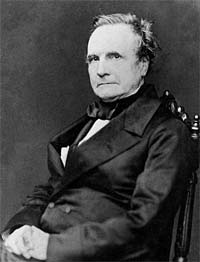Father of the personal computer
Charles Babbage was
considered to be the father of computing after his invention and concept of
the Analytical
Engine in 1837. The Analytical
Engine contained an Arithmetic Logic
Unit (ALU), basic flow control,
and integrated memory;
hailed as the first general-purpose computer concept. Unfortunately, because of
funding issues, this computer was never built while Charles Babbage was alive.
However, in 1910 Henry Babbage,
Charles Babbage's youngest son was able to complete a portion of the machine
that could perform basic calculations. In 1991, the London Science
Museum completed a working version of the Analytical Engine No 2. This version
incorporated Babbage's refinements developed during the creation of the
Analytical Engine.
Although Babbage never
completed his invention in his lifetime, his radical ideas and concepts of the
computer are what make him the father of computing.
Father of the computer
There are several people
who can be considered the father of the computer including Alan Turing, John Atanasoff,
and John von Neumann.
However, for the purpose of this document we're going to be considering Konrad Zuse as
the father of the computer with his development of the Z1, Z2, Z3, and Z4.
The Z1 consisted of over 30,000 metal parts
and is considered to be the first electro-mechanical binary programmable
computer. In 1939,
the German military commissioned Zuse to build the Z2, which was largely based
on the Z1. Later, he completed the Z3 in May of 1941, the Z3 was a
revolutionary computer for its time and is considered the first
electromechanical and program-controlled computer. Finally, on July 12, 1950, Zuse completed and
shipped the Z4 computer, which is considered to be the first commercial
computer.
Father of the personal
computer
Henry Edward
Roberts coined the term "personal computer" and is
considered to be the father of the modern personal computers after he released
of the Altair 8800 on
December 19, 1974.
It was later published on the front cover of Popular Electronics in 1975 making it an
overnight success. The computer was available as a kit for $439 or assembled
for $621 and had several additional add-ons such as a memory board and
interface boards. By August 1975, over 5,000 Altair 8800 personal computers
were sold; starting the personal computer revolution.
Why Is Charles Babbage Called The Father Of Computers?
Charles Babbage is known as the father of
computers as he was the first person to come up with the idea of a programmable
computer.
Born in 1791, he was an English mathematician, and tired of the high error rate in the calculation of mathematical tables, he wanted to find a way that they could be calculated mathematically thus removing any chance of human error.
He disliked untidiness and spurred on by this and earlier work carried out on calculating machines, he first mentioned the calculating machine in a letter in 1822.
His calculating engines were not actually completed due to funding problems and personality issues, but Babbage did prove that his machines could do the job of calculating better than any human and his steam powered devices more or less did the job correctly.
Babbage's first "difference engine" consisted of 25,000 parts and had a weight of fifteen tons. Many of his uncompleted mechanisms are now on display in the science museum and they formed the basis of what was to develop into today's computers
Born in 1791, he was an English mathematician, and tired of the high error rate in the calculation of mathematical tables, he wanted to find a way that they could be calculated mathematically thus removing any chance of human error.
He disliked untidiness and spurred on by this and earlier work carried out on calculating machines, he first mentioned the calculating machine in a letter in 1822.
His calculating engines were not actually completed due to funding problems and personality issues, but Babbage did prove that his machines could do the job of calculating better than any human and his steam powered devices more or less did the job correctly.
Babbage's first "difference engine" consisted of 25,000 parts and had a weight of fifteen tons. Many of his uncompleted mechanisms are now on display in the science museum and they formed the basis of what was to develop into today's computers


nice
ReplyDelete